Data: C(solution) 4.18 kJ/kg/°C V(solutions) 100 mL Density (solutions) = 1.0 g/mL C(solutions) = 1.0 mol/L Magnesium oxide reaction data: mMgo = 1.0 g T₁ = 28°C T₁ = 35 °C AT = Magnesium reaction data: mMg = 0.5 g T₁ = 28 °C T₁ = 46 °C AT = °C °C 5. Using the following series of reactions, calculate the heat of formation for magnesium oxide and the percentage error in the experiment. → MgO(s) + 2HCl(aq) → MgCl₂(aq) + H₂O(l) Mg(s) + 2HCl(aq) MgCl₂(aq) + H₂(g) H₂(g) + 1/2O2(g) H₂O(l) The heat of formation reaction for magnesium oxide is Mg(s) + 1/2O2(g) → MgO(s) ΔΗ, = ΔΗ2 = kJ/mol AH3-285.8 kJ/mol kJ/mol
Thermochemistry
Thermochemistry can be considered as a branch of thermodynamics that deals with the connections between warmth, work, and various types of energy, formed because of different synthetic and actual cycles. Thermochemistry describes the energy changes that occur as a result of reactions or chemical changes in a substance.
Exergonic Reaction
The term exergonic is derived from the Greek word in which ‘ergon’ means work and exergonic means ‘work outside’. Exergonic reactions releases work energy. Exergonic reactions are different from exothermic reactions, the one that releases only heat energy during the course of the reaction. So, exothermic reaction is one type of exergonic reaction. Exergonic reaction releases work energy in different forms like heat, light or sound. For example, a glow stick releases light making that an exergonic reaction and not an exothermic reaction since no heat is released. Even endothermic reactions at very high temperature are exergonic.
Using the data shown, please answer the question. Use step by step, clear and detailed solutions. No cursive handwriting please! Thank you!

Step by step
Solved in 4 steps with 7 images









